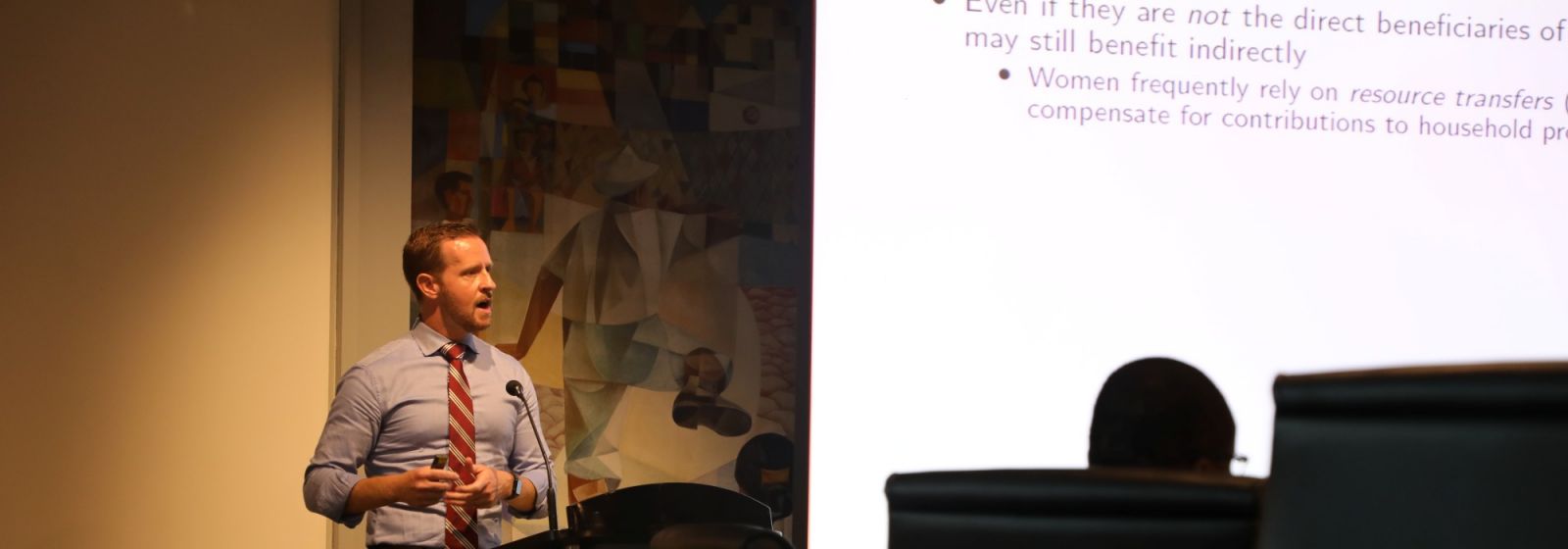14 JULY 2025 (LAGUNA, Philippines) -- “Bundling agricultural credit with crop insurance has the potential to expand rural financial markets for smallholder and marginalized farmers in Odisha," stated Dr. Patrick Ward of the University of Florida during the SIRS Seminar on the “Impacts of an innovative credit + insurance bundle for marginalized farmers: Evidence from a cluster randomized trial in Odisha, India.”
Their research team partnered with Dvara E-Registry (DER), an award-winning social enterprise in India, to offer a bundle consisting of a KhetScore loan and insurance to enable smallholder rice farmers to invest in their crop production while protecting them from loss of collateral or defaulting on loan repayment in the event of crop failure. DER pioneered KhetScore, a platform that assesses smallholder farmers’ production or profitability potential using a 3-year historical index of land analytics through remote-sensing data, artificial intelligence, and in-house algorithms. Aside from this, the team provided product trainings and informational sessions to the primary client and the co-signatory, which is another member of the opposite sex from their respective households.
“Financial inclusion and risk management are imperative for smallholder farmers to be able to invest in their agricultural production,” explained Ward. By bundling the loan with insurance, the initiative aims to alleviate credit constraints, such as a lack of a formal credit report, collateral, or documented land rights. In this case, the insurance payout is triggered when the farmer’s crops are affected by catastrophic disasters, enabling farmers to repay lenders. Cyclones and flooding frequently devastate smallholder farmers’ plots of land, particularly in the Jajpur district, a low-lying coastal plain. This is why smallholder farmers who reside there lack access to credit due to the high risks involved in farming within the district.
In India, the lack of land rights and proper documentation is a common challenge for female farmers. Intrahousehold decision-making between the male and female members of the family significantly affects how the family finances are managed. KhetScore aims to eliminate this barrier by assessing the production and profitability potential of the land using satellite data, picture-based monitoring, and machine learning, regardless of who owns the land. KhetScore can also be used in place of a formal credit score for individuals who do not have any credit reports from formal accreditors.
“In terms of the impacts on agricultural outcomes, we observed this increase in rice production during the Rabi (dry) season, which suggests that there is potential for a product like this to expand agricultural production along the extensive margin”, Ward discussed. Specifically, the insurance bundle helped increase smallholder farmers’ profits, improve rice production, and increase cultivated area by improving financial literacy, credit and insurance uptake, women’s empowerment, and alleviating the stress of near-subsistence farming.
The results also showed a decrease in informal borrowing and an increase in formal lending. “This is beneficial from a societal perspective because informal borrowing tends to be a bit harsher on borrowers. They tend to charge higher interest rates, they are not subject to regulations by banking authorities. In contrast, formal lenders are subject to regulatory oversight.” The farmers shared that the repayment terms were easier on them because of the low interest rate, which DER can offer because the loan was bundled with a crop insurance, which lowers the default risk that the lender bears. Also, since the farmers can pay the loans in installments, it lowers the barrier to transactions.
The team observed a significant increase in overall take-up of credit among women, particularly, with much of this coming in the form of formal credit rather than from informal sources. Intrahousehold surveys showed that other members of the household, like wives of those who availed the bundled insurance, stated that they witnessed improvement in their livelihoods and asset management, even though they are not the direct beneficiaries of the project.
This study also shows the potential of delivering technology-finance packages that lower the production and adoption risk and the cost of insurance so that farmers are more motivated to adopt better technology or improved rice varieties. Ward concluded that intrahousehold surveys greatly informed the results of the study, showing that by interviewing the head male and female members of the household, there are impacts that cannot be observed with a survey alone. “This just provides more evidence that, as development practitioners, we should be more holistic in our approach in trying to ascertain outcomes through these kinds of impact evaluations.”
---
READ MORE about the study at
Kramer, Berber; Pattnaik, Subhransu; Ward, Patrick S.; and Xu, Yingchen. 2023. Impacts of a digital credit-insurance bundle for landless farmers: Evidence from a cluster randomized trial in Odisha, India. Presented at the 2024 Allied Social Sciences Association (ASSA) Annual Meeting, January 5-7, 2024, San Antonio, Texas. https://cgspace.cgiar.org/items/8769581e-712d-45b5-9514-b4a856e34704




